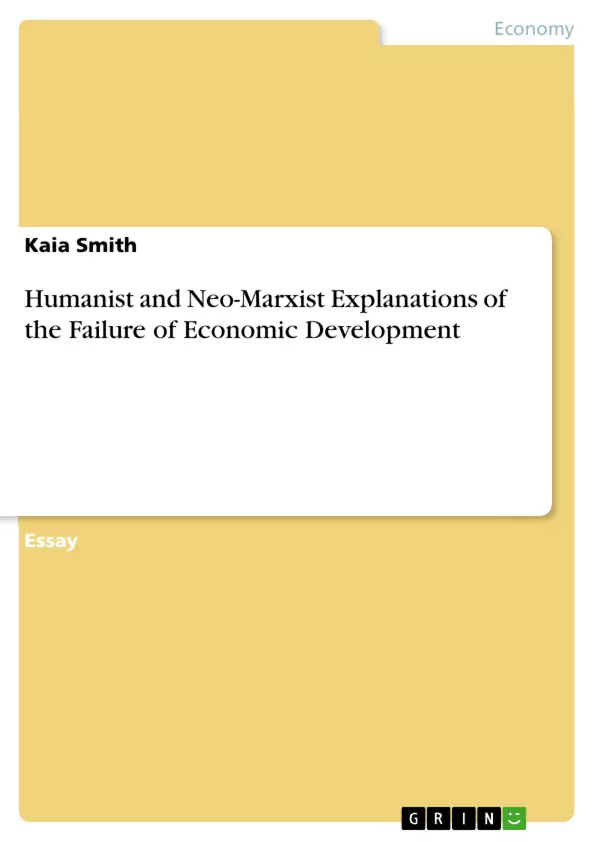Although Robert Klitgaard’s book "Tropical Gangsters" is a "compelling and entertaining account of the author’s two-and-a-half year adventure in Equatorial Guinea," its deeper exploration of the failure of economic development offers a realistic and in-depth description of the difficulty in transferring the Western model of economic theory to the developing world. From this book, one can draw various conclusions in reference to the reasons for this failure; the possibility of these criticisms is founded upon Klitgaard’s own neoclassical explanations and other alternative economic theories in reference to conditions of the country’s life and political processes. Although the neoclassical reasoning prevails, as it does in all other IMF and World Bank policies, the general lack of variety in global developmental approaches brings up the possibility of more significant and complex factors than traditional theory proposes. Both neo-Marxism and humanism offer points of view that address some of these overlooked issues. The former stresses the significance of ulterior motives of such aid organizations as the IMF and World Bank; the latter delineates the importance of non-traditional economic variables and outcomes in the overall success of economic development. In regard to the explanatory and prescriptive power of both of these policies, I find that humanism portrays more clearly the problems within the current paradigm of economic development and shows potential correctives for the future in order to increase effectiveness of foreign development efforts.
Inhaltsverzeichnis (Table of Contents)
- Neo-marxism
- Humanism
Zielsetzung und Themenschwerpunkte (Objectives and Key Themes)
This paper seeks to analyze and critique the traditional neoclassical approach to economic development, drawing on insights from neo-Marxism and humanism. The paper uses Robert Klitgaard's book, Tropical Gangsters, as a case study to illustrate the limitations of Western economic models in the developing world.
- Exploitation of Developing Countries by the Developed World
- The Role of National Elites in Perpetuating Exploitation
- The Importance of Cultural and Historical Context in Economic Development
- The Need for a More Holistic Approach to Development, Focusing on Well-being and Capabilities
- The Importance of Citizen Participation in Economic and Political Decision-Making
Zusammenfassung der Kapitel (Chapter Summaries)
Neo-marxism
This chapter explores the neo-Marxist perspective on economic development, arguing that the capitalist system inherently leads to the exploitation of developing countries by the developed world. It criticizes the role of international organizations like the IMF and World Bank in perpetuating this exploitation and argues that the only way to escape this cycle is through revolution.
Humanism
This chapter presents the humanist approach to economic development, which focuses on human well-being, individual choice, and capabilities rather than just economic growth. It criticizes the use of GDP as a measure of development and emphasizes the importance of citizen participation in political and economic decision-making.
Schlüsselwörter (Keywords)
This paper focuses on the themes of economic development, neo-Marxism, humanism, exploitation, global inequality, cultural context, and citizen participation.
Frequently Asked Questions
What is the neo-Marxist view on economic development?
Neo-Marxism argues that the capitalist system and organizations like the IMF/World Bank perpetuate the exploitation of developing countries by the developed world.
How does the humanist approach differ from traditional economic theory?
Humanism focuses on human well-being, capabilities, and individual choice rather than just GDP growth or neoclassical market variables.
What role does Robert Klitgaard's "Tropical Gangsters" play in this study?
The book serves as a case study illustrating the difficulties of transferring Western economic models to developing nations like Equatorial Guinea.
Why is GDP criticized as a measure of development?
Humanist theory suggests that GDP overlooks non-traditional variables like cultural context and the actual quality of life of citizens.
What is recommended for future development efforts?
The paper suggests a shift toward humanism to increase effectiveness, emphasizing citizen participation in economic and political decision-making.
- Citar trabajo
- Kaia Smith (Autor), 2011, Humanist and Neo-Marxist Explanations of the Failure of Economic Development, Múnich, GRIN Verlag, https://www.grin.com/document/412000



